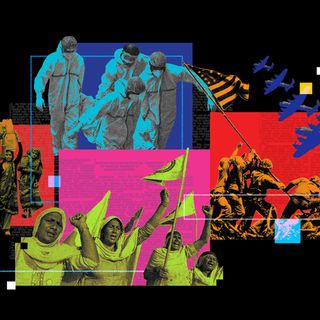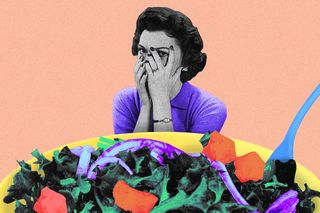
Is This Normal? ‘I Don’t Like to Eat in Front of Other People’
The greater the negativity one associates with experiences of communal dining, the more stressful the experience can become.

In this series, we dig into our strange phobias, fixations, and neuroses, and ask ourselves — Is This Normal?
I find it incredibly stressful to eat large meals around people. Chips or most conventional starters are exceptions though — as long as the latter doesn’t contain bones, and is easy to eat with just forks or toothpicks. In fact, lately, I’ve started avoiding putting myself through the stress of eating around people, and I stick to finger food — leading to conflicts with people who, for some strange reason probably spawned by social norms, refuse to respect the boundary I set and insist on having me include a large meal for myself in the dinner order. Little do they understand that I find it so stressful to do that, that before I go out to meet people, I prepare small meals that I can simply heat up and have once I’m back. I’m aware by now that I’m never going to eat to my fill around people, and don’t want to go to bed on an almost-empty stomach.
I understand it’s definitely not conventional, but is it “normal”? Well, given that we’re all wired differently, are molded by diverse life experiences, and live with distinct health conditions, one person’s “normal” might not agree with another’s.
For starters (no pun intended), food-shaming can make people self-conscious about eating around others. Statements like — “I cannot believe you’re going to eat all of that by yourself;” “How can you be hungry already? I just saw you eat;” “I’m guessing you don’t know just how much weight those cookies will make you put on;” “Wow, you eat really little;” “I don’t care, you have to eat another parantha, people your age shouldn’t be eating so less;” “I cannot believe someone can eat so slowly” — may lead people to feel guilty about eating too much, preventing them from enjoying their food, or force them to overeat under pressure. The greater the negativity one associates with experiences of communal dining, the more stressful the experience can become.
“[W]hen she asked me if I wanted seconds, I accepted… until she called me ‘a little gannet’ as she was heaping it on my plate, and the entire table laughed at me,” Lisa Bowman wrote in Metro. “From that moment on, I barely touched my food at their house as I was so embarrassed.”
Related on The Swaddle:
What Happens to Our Bodies When We Eat All Our Meals in Front of the TV
Of course, for those living with eating disorders or body image issues, such statements can be triggering. But given that we can’t truly be aware of who’s struggling with what behind closed doors, perhaps, it’s always more considerate to avoid making unwarranted comments on people’s food habits. “The fact that a person [currently has] or is recovering from an eating disorder is completely irrelevant. It’s rude for somebody to… comment on what somebody else is eating,” a Quora user wrote, adding, “I would point out that I am responsible for my food choices and the consequences of those choices. Their input is unwelcome.”
However, negative comments around eating habits aren’t just limited to the quantity of food one is eating. Social conventions around dining can pose challenges for people like me. As an autistic person, I struggle with proprioception — defined as the “perception or awareness of the position and movement of the body.” As a result, not only do I struggle to use chopsticks, or even knives and forks together, but I often end up causing my food to ricochet off my plate, drop my cutlery, or simply, struggle to eat things like chop suey or khao suey without spilling it everywhere.
And if I do manage to somehow avoid doing all of these — which, believe me, is next to impossible for my disabled self — then I’ve spent so much time ensuring I don’t make a fool of myself in public that I’ve forgotten to enjoy my food.
Social anxiety, when combined with these, makes communal dining a recipe (no pun intended, again) for disaster — mostly, an implosive one.
Further, my autism-induced hypersensitivity also makes me avoid certain textures and flavors of food to avoid getting overwhelmed, or triggering my gag reflex. My IBS, too, makes me avoid certain foods to steer clear of flare-ups — especially if I know I’ve dealt with stress (another trigger for the syndrome) recently. People, unfortunately, believe they deserve an explanation every time I say “no” to a certain food rather than simply respecting my decision.
My hypersensitivity also makes me hyperaware of the noise of someone else chewing, of the smell emanating from their food, of the sound of their cutlery hitting their ceramic plate — making the whole experience so overwhelming that I can barely relish what’s on my plate.
Related on The Swaddle:
Is This Normal? “I Like Eating Paper”
So, naturally, it just seems easier to not eat around them than to explain why I’m refusing to eat something, only to be met with invalidation and unsolicited advice about how to enjoy those things anyway — often from people who neither share my lived experiences nor are medical professionals specializing in either neurodivergence or any health condition I live with.
Moreover, some people are simply not comfortable with eating around others as a result of formative childhood experiences; it’s just not their “normal.” In 2021, The Swaddle interviewed an individual who said, “I find it difficult to eat with people. If I absolutely have to, I just take a couple of bites and I’m done. It’s relatively easier for me to eat when I’m alone. I think that may have something to do with the fact that we never sat down and ate together as a family while I was growing up. We would just serve ourselves whenever we were free. It’s a very small thing, but I realize how big of an impact it’s had on my life. If I’m sitting with 10 people, I simply don’t know how to eat — I feel super awkward; it doesn’t feel natural to me.”
And after a long day at work, is it really fair to prevent someone from enjoying their meal in peace simply because it might go against social conventions rooted in, well, who knows what!
And so, I’ve decided that for me, eating by myself is “normal” — irrespective of how others feel about it. As the Quora user notes, “I would tell a person that in order for us to continue to enjoy each other’s company, they’re going to have to refrain from evaluating and judging my personal choices.” I might take a leaf out of their book, too, and be firmer about my boundaries so I don’t have to put myself through unnecessary stress just to please them.
Devrupa Rakshit is an Associate Editor at The Swaddle. She is a lawyer by education, a poet by accident, a painter by shaukh, and autistic by birth. You can find her on Instagram @devruparakshit.
Related


How Celeb Fan Culture Minimizes Accountability
